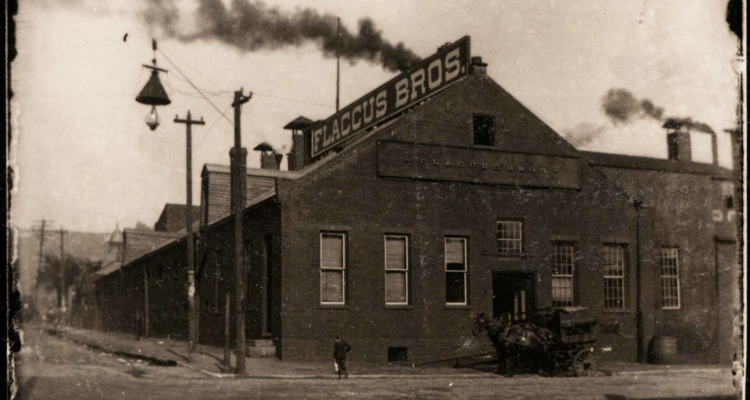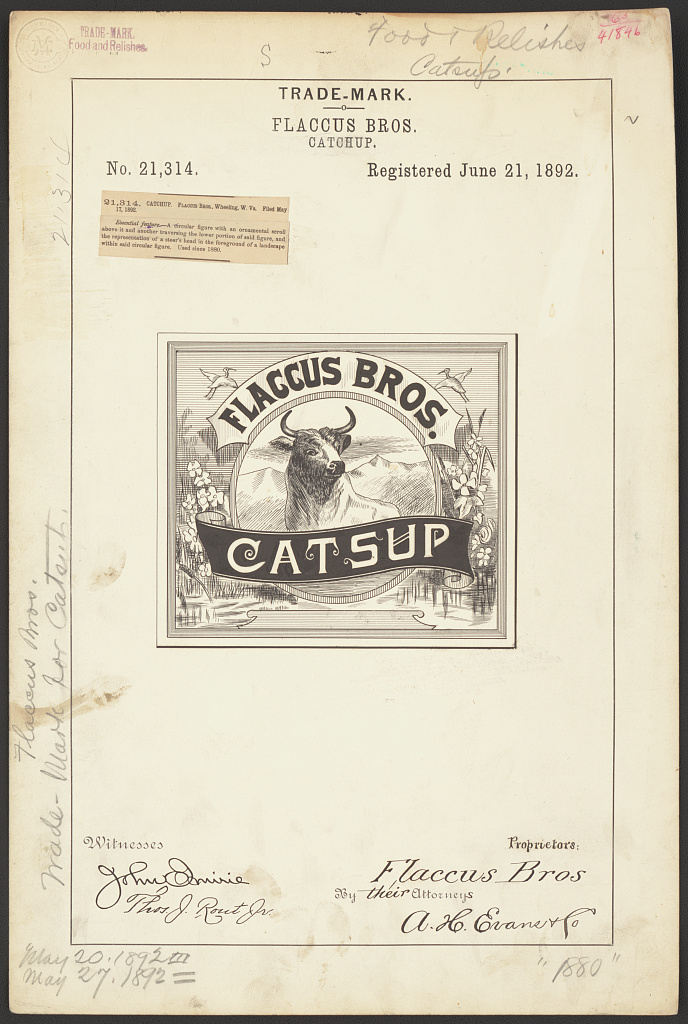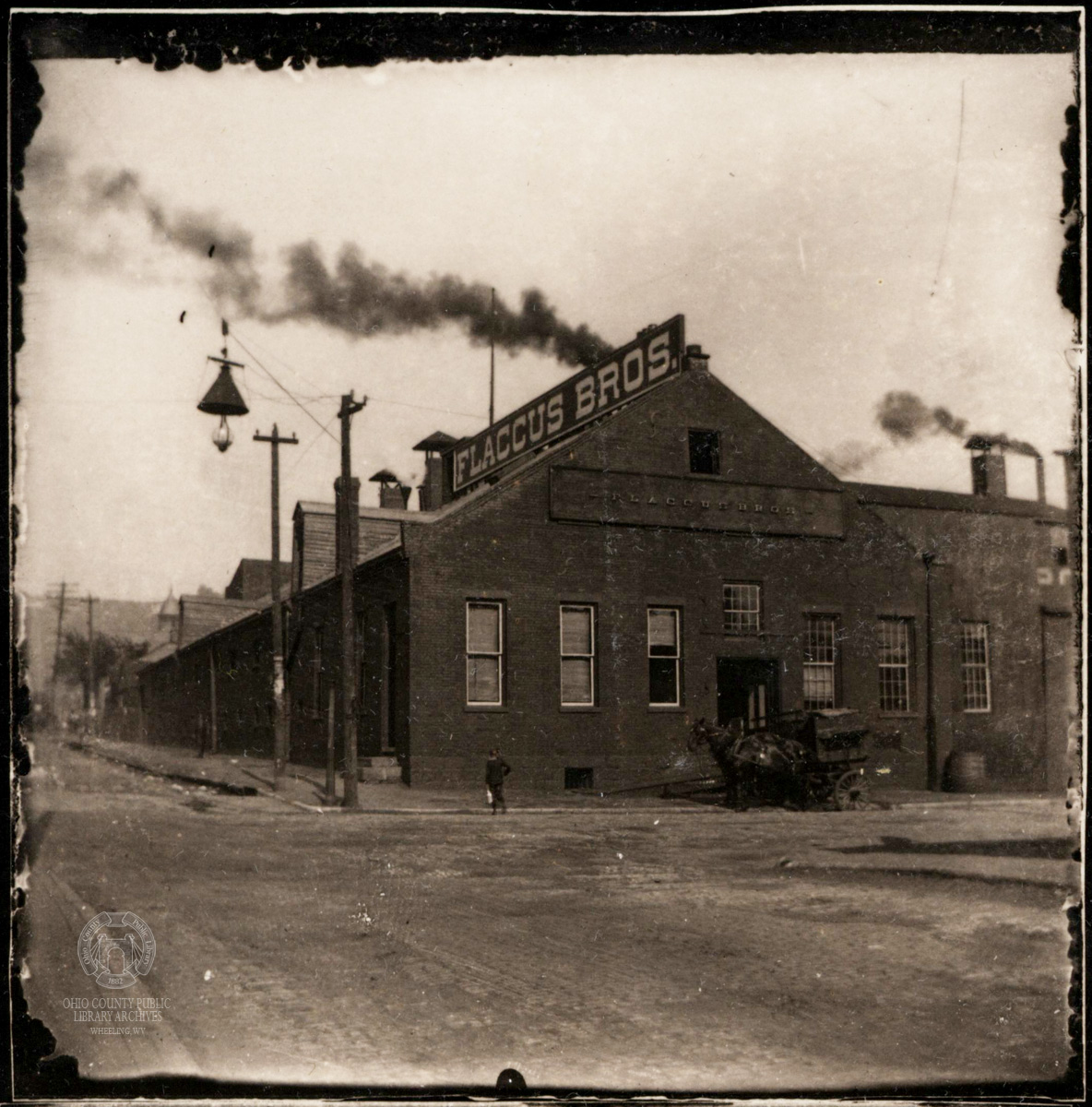Look around your house or town…what types of brands can you recognize solely from their trademark? What brands scream Wheeling?
The effect of a well-designed brand on a consumer is not something invented in the 21st century—plenty of Wheeling businesses back in the 19th century registered and used trademarks to advertise and distinguish their products from competitors. Check out a few of these century-old trademark illustrations from Wheeling’s past!
Bloch Brothers for West Virginia Mail Brand Cigars, Cigarettes, and Chewing and Smoking Tobacco
Some of the most ubiquitous images throughout West Virginia are the Bloch Brothers’ Mail Pouch Chewing Tobacco barn signs. Before they created West Virginia’s popular product, Aaron and Samuel Bloch ran a grocery store and operated a cigar factory on their second floor. After a while, they began flavoring, packaging, and selling the leftover cigar clippings as chewing tobacco. Their thrifty venture became wildly popular.
Bloch Brothers registered this trademark in 1883—the year before Wheeling’s Flood of 1884 ruined their store and they shifted to selling tobacco products exclusively. The trademark includes their iconic mail pouch symbol, assuring customers they were buying the genuine product. By the turn of the century, Bloch Brothers Tobacco Company employed hundreds of people in Wheeling. Today, the Bloch Brothers Mail Pouch Tobacco “ghost sign” in South Wheeling is one of the city’s most recognizable landmarks.
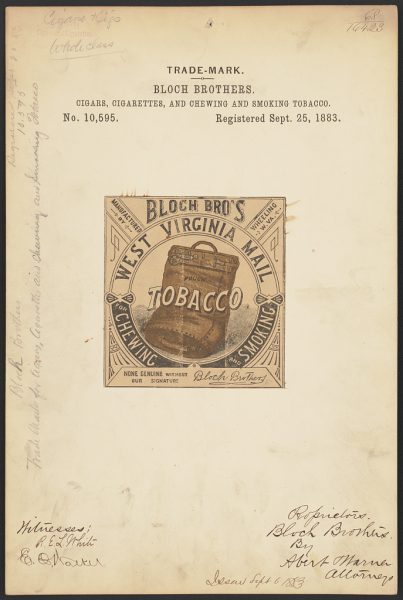
Flaccus Bros. Catsup
In the mid-1870s, George A. Flaccus and his brothers opened a wholesale grocery store, mostly selling products they manufactured themselves. Their grocery was located at the corner of 23rd and Market Streets in the Centre Market District, but it moved to 17th and Chapline Streets in 1890.
The Flaccus Brothers made and sold a variety of products from preserves, mincemeat, pickles, and other canned goods—but they became known for their famous Steers-Head Catsup (ketchup). Shipping their catsup all over the country, the company needed a distinct and recognizable trademark to distinguish their product from competitors.
The Pan Handle Brand Roasted Coffee (Simon Baer’s Sons)
Like many others who make up Wheeling’s history, Simon Baer was a Jewish immigrant from (what is now) Germany in the mid-19th century. After buying a wholesale grocery store from his brother-in-law, Simon Horkheimer (or Harkheimer), Simon Baer incorporated his sons into the business, naming it Simon Baer & Sons. It became known as one of Wheeling’s largest wholesalers—rivaling businesses in bigger cities, like Pittsburgh. After the death of his son Benjamin, Simon Baer retired in 1884 and several of his remaining sons (Henry, Marcus, Bernhard, and eventually Ernest) formed a new business—Simon Baer’s Sons.
At the turn of the century, Simon Baer’s Sons (and subsequent versions of the company) operated out of a warehouse on 16th and Main Streets—now the Boury Lofts building. While offering numerous products, Simon Baer’s Sons became known for their Pan Handle Coffee and sold it throughout the larger region. According to a Wheeling Daily Intelligencer article, the company’s production capacity in 1886 was about 3,000 pounds of coffee per day. In their trademark registration, the main bear hoists packages of Pan Handle Coffee in the air while other bears gleefully knock down competitor’s coffee packages.
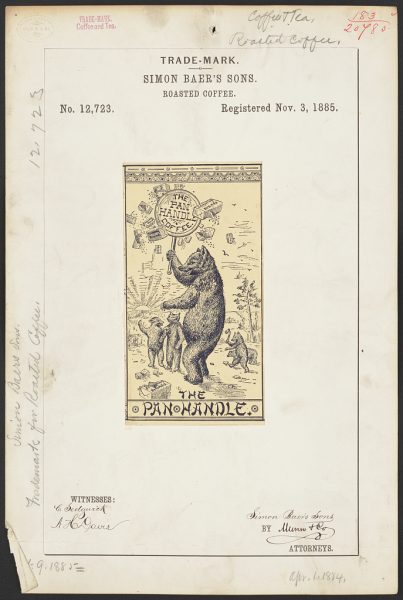
The Reymann Brewing Company’s Parlor Beer
While no longer a place to get a beer in the Friendly City, at one point, the Reymann Brewing Company was the largest brewery in the state of West Virginia. Originally the Franklin Brewery, Anton Reymann eventually took over the business in the 1860s. Decades later, this 1897 trademark was made specifically for the company’s “Parlor Beer,” a type of lager beer. Located in Manchester (across Wheeling Creek from East Wheeling), Reymann grew the brewery into a high-producing company. In addition, for a time, the Reymann Brewing Company owned and operated Wheeling Park in the style of a German beer garden.
West Virginia’s Yost Law prohibiting alcohol in the state forced the Reymann Brewing Company to close in 1914. While the physical brewery and buildings are largely in ruins, you can still learn more about the history of brewing in Wheeling by listening to Weelunk’s podcast, Henry: The Life and Legacy of Wheeling’s Most Notorious Brewer.
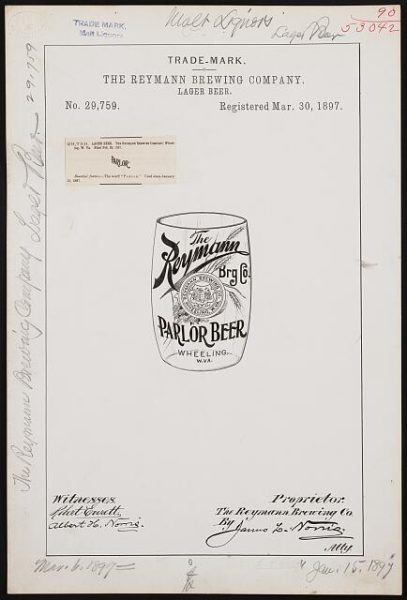
If you want to explore more historic trademarks, check out this helpful guide from the New York Public Library and find more Wheeling-specific trademarks online at the Library of Congress!
• Emma Wiley, originally from Falls Church, Virginia, was a former AmeriCorps member with Wheeling Heritage. Emma has a B.A. in history from Vassar College and is passionate about connecting communities, history, and social justice.
References
1 Katherine M. Jourdan, “Bloch Brothers Tobacco Company,” e-WV: The West Virginia Encyclopedia, 2010, https://www.wvencyclopedia.org/articles/549.
2 “Flaccus Brothers,” Ohio County Public Library, https://www.ohiocountylibrary.org/history/5535.
3 Gibson L. Cranmer, History of the Upper Ohio Valley, Vol. I, (Madison, WI: Brant & Fuller, 1890), 217-218. Brant & Fuller, 1890.4
4 Jeanne Finstein, “#2 16th Street, Boury Building,” Friends of Wheeling, 2015, https://jfinstein.wixsite.com/friends-of-wheeling/baer-boury.
5 “Coffee Roasting,” The Wheeling Daily Intelligencer, September 14, 1886, https://www.ohiocountylibrary.org/history/2719.
6 “Reymann Brewing Co.” Ohio County Public Library, https://www.ohiocountylibrary.org/history/2776.
7 Mary Merolle, “Prohibition,” e-WV: The West Virginia Encyclopedia, 2018, https://www.wvencyclopedia.org/articles/1931#:~:text=State%20prohibition%20was%20enforced%20under,wet%20states%20to%20dry%20states.


